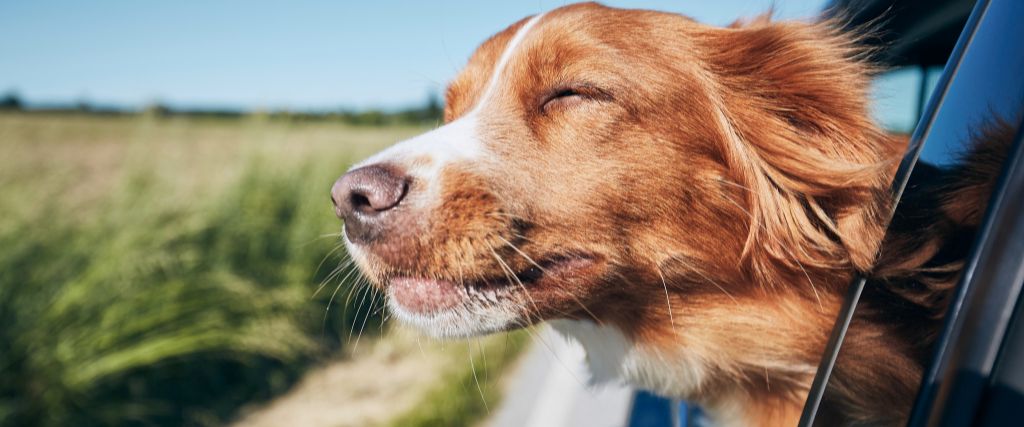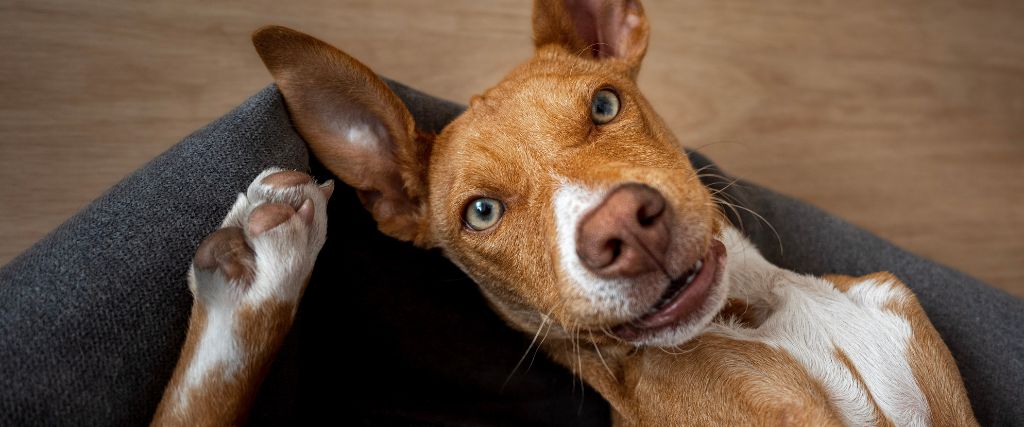Sometimes, we witness our dogs acting strangely or doing something that makes us curious. Much like humans, dogs have habits, rituals, and personality traits that make them unique, and we're left to decipher what they mean in the absence of human conversation.
From wrapping their paws around your arm to tilting their head, we've compiled the top 10 most commonly asked questions about dogs and their surprising answers.
1. Why do dogs wag their tails?
Dogs instinctively wag their tails when happy or excited, but they also wag their tails to express other emotions, such as nervousness or anxiety.
Let’s prance into the whimsical world of dogs and their expressive tails! You see, when your dog wags its tail, it’s like a symphony of emotions, with each swish, sway, and wiggle conveying a different tune of feelings. Most commonly, the tail wag is synonymous with a joyful serenade, a merry expression of happiness and excitement. When your dog sees you after a long day or is presented with their favorite toy, their tail wags in delightful harmony, showcasing their elation and contentment.
However, not every wag is a jovial jig; sometimes, it’s a tense tango reflecting agitation or anxiety. A tail held high, wagging rapidly, might depict a vigilant waltz, signaling that your furry friend is alert and assessing the environment, whereas a slow, low wag could be a melancholic ballad representing insecurity or submission. Tail wagging is thus the melodious language of dogs, a fascinating dance of emotions and intentions, where each movement holds a secret whisper of their inner world. So, next time you witness this enchanting dance, you'll know, it’s not just a wag, it’s a symphonic poem of feelings, each swish a note, each wag a word, telling you more about your furry companion’s colorful emotional palette!
2. Do dogs dream?
Science whispers a fascinating ‘yes’ to this charming inquiry! When dogs drift into the realm of Morpheus, their brains embark on an intricate dance of neural ballet, resembling that of their two-legged companions. Just like humans, dogs experience Rapid Eye Movement (REM) sleep, the stage closely linked with the phenomenon of dreaming. As your beloved canine companion nestles in the world of dreams, it is plausible that they frolic in meadows of their imagination, chase phantom squirrels, or relive joyful encounters with their human pals. Observing the subtle quiver of their paws or the gentle twitch of their whiskers can be like peeking through a keyhole into their dream-filled realm, where tales of adventure and echoes of the waking world intertwine in a fantastical tapestry of sleep-bound narratives.

3. Why does my dog lick everyone?
Dogs lick people they've become comfortable with for two very different reasons. They're giving that person a sign of affection, or they like the taste of their skin. Sometimes you'll notice your dog licking your hands and fingers after a meal, and that's because they smell the food. If you haven't eaten anything recently, it's more likely a sign of affection.
4. Why does my dog howl?
Dogs are descendants of wolves, so howling is an instinctive trait passed down from their ancestors. Domesticated dogs howl for three reasons: to communicate because they're sick or injured and separation anxiety. It's normal for a dog to howl as long as it's not happening several times a day, and often a dog doesn't even know why they're doing it. You'll also find that a dog will repeat a howl if its owner howls, which is their way of trying to communicate and be a part of the pack.
5. Why does my dog scoot its butt along the carpet?
Scooting is a common dog behavior, so don't worry. Your dog could just be relieving an itch. However, if it's happening every day, it might require a trip to the veterinarian since it could indicate allergies, parasites, or a clogging issue with your dog's anal glands. The American Kennel Club offers more insight into butt scooting.
6. What does it mean when my dog wraps its front paws around my arm?
Simply put, your dog adores you. A dog wrapping its paws around your arm is one of their highest levels of affection. Considered to be the human equivalent of hugging, dogs will often do this to return or give affection since they can't embrace you in a real hug.

7. Why does my dog tilt its head?
When a dog cocks its head to the side, they're focused on hearing your words and understanding what you're saying. In other words, they're in a heightened state of concentration. You've probably noticed this also happens when they hear strange noises, often high-pitched. They're trying to figure out the sound, where it's coming from and what it means.
8. Why is my dog's nose wet?
The science behind your dog's wet nose is quite surprising. While many assume it's because they're trying to smell something, dog noses are also wet because that's one way they regulate their body temperature. Dogs evaporate heat through their nose since they don't sweat like humans, which helps keep them cool. Learn about other reasons your dog's nose may be wet or dry from the ASPCA.
9. Why does my dog circle before lying down?
As we mentioned earlier, before, dogs were our loyal companions, basking in the comfort of cushioned beds and cozy blankets, they were creatures of the wild, with fields, forests, and plains as their resting grounds. The act of circling before lying down is akin to a waltz of instinct, a primordial dance, ensuring their sleeping quarters were just right. By trampling down the imaginary foliage, our canine friends were ensuring their bed was free of lurking critters and uncomfortable twigs, creating a nest-like sanctuary to ward off the elements and conceal themselves from predators. This delightful dance could also serve to establish the direction of the wind so that they could position themselves appropriately to sense any approaching friend or foe while they rest.
10. Why does my dog stare at me?
This common question has many possible answers, so it's best to connect the stare to the current environment or situation. Dogs stare at their owners because they're gazing in adoration, reading your body language, or want something like attention or food. These types of stares are very different from aggressive stares, which often come with a growl or showing teeth.
If your dog is exhibiting curious behavior that indicates injury, illness, or aggressiveness, contact your veterinarian to discover the root cause of the habit or behavior.
These top 10 inquiries are but a gateway into the vast, fascinating universe of our canine companions, each answer a stepping stone deeper into understanding and connecting with our four-legged friends. As we continue our journey alongside them, let us keep exploring, learning, and marveling at the myriad ways in which they touch our souls, awaken our curiosity, and enrich our lives with their sweet, loving presence. Here’s to more discoveries and delightful dances with our dogs in the magical realm of companionship!
Don't have a vet in your area yet? We can help you find a local veterinarian. If you have more questions, the GeniusVets Telehealth platform will give you unlimited access to text and/or video calls with board-certified veterinarians! To learn more click here.


The Ultimate Guide
to Dog Care
This free guide is an indispensable manual for dog ownership. Filled with veterinary advice and recommendations on every important topic at each stage of your dog’s life, this is all the stuff that responsible dog owners need to know. That is why we are making it free!
